| HIS Excellency Simon Roded took charge of the Israeli Embassy in Thailand in September 2012. It was his first posting as ambassador, but his 38-year career at the Ministry of Foreign Affairs (MFA) makes him one of Israel’s most senior and experienced diplomats. During a lengthy interview with The BigChilli at his Bangkok residence, Mr Roded fielded questions on a number of issues including negative perceptions of Israel, the recent wave of Israeli-Palestinian violence, and globally increasing anti-Semitism. “I was born in Haifa, a city in north Israel on April 6, 1955. My sister and I are the children of survivors of the Jewish holocaust. Our parents were born in northern Romania and during WWII they were deported from their hometown by the authorities to |
a labor camp. After the war, their property was confiscated and they had nothing to come back to. At the time they weren’t yet married. They started off on a difficult journey to the Land of Israel that is now the State of Israel and was then under British mandate. But they were prevented from entering Israel and were held by the British army in a detention camp in Cyprus. My parents got married in the camp and after the establishment of the State of Israel in May 1948 they were allowed in. They arrived there in early 1949.
“My father was a police officer in Israel and my mother was a housewife. They came out of Europe, with literally their shirts on their back, to the newly founded Jewish state to build a home and a new life, as did millions of other survivors.
“I joined the Israeli Ministry of Foreign Affairs 1978, so I guess you could say I am a career diplomat. I started with the MFA as a student working the nightshift, and after I graduated one thing led to another. I took my position as ambassador to Thailand in September 2012 and I have one more year to go. I find the job challenging and I hope that I am fulfilling all expectations. I am also accredited to Cambodia, and visit there a few times a year.”
Mr Roded’s first visit to Thailand was in 1990, when he was sent by the MFA for a short assignment. “I will never forget the trip from Don Mueang airport to Sukhumvit Road. It took me almost four hours. There wasn’t a BTS at that time, only a wide road with thousands of motorcycles. I was overwhelmed, but I immediately fell in love with Thailand – the people, temples, food, street vendors and busy city life going on day and night. Everything was very strange and different from what I knew. After I left the country I told my wife: ‘We need to come back here.’ We later visited many times both privately or on assignment.”
“My father was a police officer in Israel and my mother was a housewife. They came out of Europe, with literally their shirts on their back, to the newly founded Jewish state to build a home and a new life, as did millions of other survivors.
“I joined the Israeli Ministry of Foreign Affairs 1978, so I guess you could say I am a career diplomat. I started with the MFA as a student working the nightshift, and after I graduated one thing led to another. I took my position as ambassador to Thailand in September 2012 and I have one more year to go. I find the job challenging and I hope that I am fulfilling all expectations. I am also accredited to Cambodia, and visit there a few times a year.”
Mr Roded’s first visit to Thailand was in 1990, when he was sent by the MFA for a short assignment. “I will never forget the trip from Don Mueang airport to Sukhumvit Road. It took me almost four hours. There wasn’t a BTS at that time, only a wide road with thousands of motorcycles. I was overwhelmed, but I immediately fell in love with Thailand – the people, temples, food, street vendors and busy city life going on day and night. Everything was very strange and different from what I knew. After I left the country I told my wife: ‘We need to come back here.’ We later visited many times both privately or on assignment.”
| Bilateral relations “We moved in December 1995 to the current embassy in the Ocean Tower 2 Building, Sukhumvit Road Soi 19. Altogether we have 70 staff, with about 45 from Israel and the rest are Thais. We are blessed with one of the best local teams I have seen in the many years that I have been posted at our embassies abroad. I am proud of them. My last position before coming here was as Deputy Director-General for Human Resources at the MFA, so I have a good base for comparison,” said Mr Roded. Thailand and Israel established diplomatic relations in 1954, making 2014 the 60-year anniversary. “Last year was extremely intensive for us, and even in the midst of the internal problems in Thailand we succeeded in organizing celebrations to mark the anniversary in a series of cultural events. |
“Relations between our two countries are good and comprehensive in many dimensions. We have a lot of areas of cooperation besides government to government. We cooperate on trade matters, agriculture, science, education and other fields. Since the beginning of this year multilateral regional cooperation has been coordinated through the Thailand International Cooperation Agency and the Israeli International Cooperation Agency (MASHAV).
“These agencies are organizing joint activities open to participation by other countries in the region. So we are in a sense moving up the ladder of cooperation between our two countries and the region as a whole.
“Actually, the activities of MASHAV in Thailand go back to 1964, and almost from the beginning of the Israeli foreign activities abroad, Thailand has been one of the countries we have worked with. There’s a great deal of appreciation in Thailand for Israel’s achievements in spite all the difficult conditions and hardships we’ve endured, and as ambassador this is very flattering. There’s a lot of admiration for Israel in Southeast Asia and Asia in general, especially in countries we have diplomatic relations with, such as Cambodia, Myanmar, the Philippines, Thailand and Vietnam.
“At the end of the day, international relations are a matter of political interest, but at an informal level there’s an almost unanimous feeling of appreciation in Southeast Asia for the successes and achievements of Israel throughout the years.”
Mr Roded doesn’t travel within Thailand as often as he would like, but from time to time is able to get out of Bangkok for business or pleasure. “I like to visit the North and the South, to see the islands and experience all the different traditions, customs, cuisines and landscapes. Thailand is a very big and beautiful country and very rich in resources of all kinds.
“Last July I went with former Finance Minister Korn Chatikavanij to visit a farm in Phitsanulok province. It was a very nice and enlightening experience. I was happy to see that agricultural technology that was invented and implemented in Israel is being adapted to Thai conditions. What pleased me most was to see that it is helping farmers socially and financially for the improvement of their lives. This is what we are hoping for, that our products, inventions, methods and experiences can be put to good use. And on a personal level, this is also my mission in Thailand. I want to be a part of something that contributes to the good of the Thai people.
“I look at the Jewish community in Thailand as a part of our constituency here. There are few synagogues in Thailand. In Bangkok there is one on Sukhumvit Road Soi 22 and another on Khao San Road, which is mainly for tourists. Soi 22 is where the local Jewish community goes. I usually go there, especially during high holidays, to pray for peace and for Israel. There are also synagogues in Chiang Mai, Phuket and Koh Samui, and these are attended mostly by Israeli tourists.
“Some Israeli companies are represented in Thailand; mostly they are based in Bangkok. These companies are mainly involved in project management and engineering as well as agro-technologies. There are also a few Israeli jewelry manufacturers operating here. I had a chance to visit one and it was fascinating to watch them work. The Thai workers are exceptionally skilled at making earrings and other jewelry, and their level of accuracy is amazing. The visual focus and steady hands of the workers are quite impressive.”
Mr Roded said that around 150,000 Israelis visit Thailand annually, which is quite a lot considering that the population of Israel is only around 8.2 million. “In high season Israelis are flocking to Thailand by the planeloads. You won’t find an empty seat on flights. Recently Thai cuisine has become very popular in Israel and recipes for Thai dishes can be found in newspapers and the internet. There are a few hundred Israelis permanently residing in Thailand, in Bangkok and certain other parts of the country.
“Not many Thais are visiting Israel, but we have 23,000 Thai workers at any given time, almost all in the agricultural sector. This has been going on for 20 years. More than 100,000 Thais have worked in Israel. Usually they work for five years and then come back home. Five years is a long time, so these workers know Israel very well and they are rather well assimilated. They have been a part of Israeli society for a long time now and they are very much appreciated. As a matter of fact, Thai workers are the backbone of Israel’s agricultural industry.”
“These agencies are organizing joint activities open to participation by other countries in the region. So we are in a sense moving up the ladder of cooperation between our two countries and the region as a whole.
“Actually, the activities of MASHAV in Thailand go back to 1964, and almost from the beginning of the Israeli foreign activities abroad, Thailand has been one of the countries we have worked with. There’s a great deal of appreciation in Thailand for Israel’s achievements in spite all the difficult conditions and hardships we’ve endured, and as ambassador this is very flattering. There’s a lot of admiration for Israel in Southeast Asia and Asia in general, especially in countries we have diplomatic relations with, such as Cambodia, Myanmar, the Philippines, Thailand and Vietnam.
“At the end of the day, international relations are a matter of political interest, but at an informal level there’s an almost unanimous feeling of appreciation in Southeast Asia for the successes and achievements of Israel throughout the years.”
Mr Roded doesn’t travel within Thailand as often as he would like, but from time to time is able to get out of Bangkok for business or pleasure. “I like to visit the North and the South, to see the islands and experience all the different traditions, customs, cuisines and landscapes. Thailand is a very big and beautiful country and very rich in resources of all kinds.
“Last July I went with former Finance Minister Korn Chatikavanij to visit a farm in Phitsanulok province. It was a very nice and enlightening experience. I was happy to see that agricultural technology that was invented and implemented in Israel is being adapted to Thai conditions. What pleased me most was to see that it is helping farmers socially and financially for the improvement of their lives. This is what we are hoping for, that our products, inventions, methods and experiences can be put to good use. And on a personal level, this is also my mission in Thailand. I want to be a part of something that contributes to the good of the Thai people.
“I look at the Jewish community in Thailand as a part of our constituency here. There are few synagogues in Thailand. In Bangkok there is one on Sukhumvit Road Soi 22 and another on Khao San Road, which is mainly for tourists. Soi 22 is where the local Jewish community goes. I usually go there, especially during high holidays, to pray for peace and for Israel. There are also synagogues in Chiang Mai, Phuket and Koh Samui, and these are attended mostly by Israeli tourists.
“Some Israeli companies are represented in Thailand; mostly they are based in Bangkok. These companies are mainly involved in project management and engineering as well as agro-technologies. There are also a few Israeli jewelry manufacturers operating here. I had a chance to visit one and it was fascinating to watch them work. The Thai workers are exceptionally skilled at making earrings and other jewelry, and their level of accuracy is amazing. The visual focus and steady hands of the workers are quite impressive.”
Mr Roded said that around 150,000 Israelis visit Thailand annually, which is quite a lot considering that the population of Israel is only around 8.2 million. “In high season Israelis are flocking to Thailand by the planeloads. You won’t find an empty seat on flights. Recently Thai cuisine has become very popular in Israel and recipes for Thai dishes can be found in newspapers and the internet. There are a few hundred Israelis permanently residing in Thailand, in Bangkok and certain other parts of the country.
“Not many Thais are visiting Israel, but we have 23,000 Thai workers at any given time, almost all in the agricultural sector. This has been going on for 20 years. More than 100,000 Thais have worked in Israel. Usually they work for five years and then come back home. Five years is a long time, so these workers know Israel very well and they are rather well assimilated. They have been a part of Israeli society for a long time now and they are very much appreciated. As a matter of fact, Thai workers are the backbone of Israel’s agricultural industry.”
 Negav, by Avraham Kushnirov
Negav, by Avraham Kushnirov Living with bad press
Mr Roded noted that the world tends to view Israel through the context of the long-standing Israeli-Palestinian conflict. “We are trying to portray Israel outside the context of this conflict and the other problems of the troubled Middle East. The mass media coverage of Israel gives the image of a place full of war and violence. This is completely out of touch with reality. If you go to Israel you find people living ordinary daily lives. We didn’t achieve what we have in our more than 67 years of independence only by fighting wars. We have developed science and culture and we have a good cuisine. We not only have a good standard of living, we have an enjoyable lifestyle. It is a great place for tourists to visit. But you rarely see this on television; you only see the violence.
“So in recent years we have tried to expose the other faces of Israel. It is a country where normal people live, go to work, develop themselves, enjoy life and go the beach, to parties, restaurants and so on.
“If you were to make a list of Israeli contributions to technology, science and healthcare, you would be amazed at how many innovations have come out of Israel. Most Thais know about drip irrigation, but just look at the computer world. The Intel chips for almost every computer in operation today were designed, developed and produced in Israel. Basic technology like Voice over Internal Protocol (VoIP) came out of Israel. Chatting on the computer over the internet was initially introduced in Israel. Today Israel may be number one in the world in developing cyber security technologies. These days you cannot do business anywhere without cyber security; it has nothing to do with the Middle East conflict.
“A total of 12 Nobel Prize laureates have come out of the State of Israel since its creation. These laureates are all Jewish, but they are Israeli. Our citizens have won Nobel Prizes in literature, peace, physics and other sciences. Again, this has nothing to do with the conflict. On the contrary, it is in spite of the conflict. While dealing with some difficult situations we have continuously developed ourselves and our country, and if we compare our achievements to our neighbours’ it makes us proud. This could really be the subject of an entire lecture.
“One of the things we do as a matter of principle is to share our hard earned experiences. Because of where we came from, we have had to find solutions the hard way out of necessity. Necessity is the mother of invention. We have had to deal with different problems and situations that demanded innovative solutions, including military solutions.
“The latest solution is our famous Iron Dome anti-missile system. The world became familiar with Iron Dome in 2014. It has a 90 percent success rate in shooting down crude and short-range missiles fired on Israeli civilians. Intercepting an incoming missile – finding it in the middle of the sky and destroying it – requires a great deal of accuracy, technical capability and ingenuity. Nobody believed it could be done, but we have proved that the system works. Now, Israel has celebrated its 67th year of Independence.
“I can’t help but think of the struggles of my own parents who came to this land with almost nothing together with others who over the years worked hard to build up this nation to attain the social, economic and political achievements that we see today. Now, at the age of 60, when I look back I feel privileged to serve as the ambassador of this country.”
Anti-Semitism
“Anti-Semitism is on the rise in the world and this can be statistically measured by the increasing number of incidents like attacks on Jews, and swastikas painted on Jewish cemeteries or synagogues. The list is very long. There’s a new kind of anti-Semitism which is playing out against the backdrop of what is going on in the Middle East, for example events in Gaza in 2014. There is a very large amount of anti-Semitic literature and comments coming out of some Muslim communities and some Muslim leaders all over the world, including in Thailand. Mainly this is being aired in social media.
“In Thailand you see very often the misuse of Nazi symbols, and this is usually out of ignorance. The horrible events of World War II and the Holocaust are almost never included in the curriculum of any school here. Thai youngsters can get through their entire education without even encountering this dark chapter of history, which is very regrettable. As a result you have a generation of people who are completely ignorant of these events and when they use Nazi symbols and trivialize them they don’t understand what it means to others. We have pointed this out to Thai officials more than once. One can only hope that in due course the educational system here will mature and these and other important historical events will be included in school curriculums.
“Very rarely do we encounter genuine anti-Semitism in Thailand. Recently we came across a Facebook page expressing admiration for Hitler and spewing the kind of anti-Jewish language that was voiced in the 1930s in Europe, but this was a rare case and we dealt with it. I think that anti-Semitism is something that all governments should be dealing with and it is not only the problem of the State of Israel.
“As for what is occurring in our part of the world now, we are definitely facing incitement against Israel on two levels. The first is from official media outlets of the Palestinian Authority [PA] and Hamas, which is a terrorist organization, urging people to go out on the streets, take knives and stones and kill Jews. These outlets tell lies and distortions, make offensive caricatures and such like. It is blunt incitement coming from the leaders of people we are supposed to make peace with. By definition, we make peace with our enemies not friends, but having said that, we can’t continue with incitement like this.
“The second and more disturbing level of incitement starts when children begin kindergarten. It’s in their school textbooks, in the street signs named after terrorists, and graffiti on the walls glorifying terrorists. The children are surrounded and brainwashed. That’s something we have been pointing out to our neighbours for many years.
“We have asked the PA to modify the textbooks and take out the hate speech. If you brainwash the young generation and teach them to hate and to kill Jews, what kind of peace can you expect? That’s why you see 13 and 15-year-old boys taking a knife, going to the nearest Israeli town and trying to kill passersby. Yet PA President Mahmoud Abbas claimed that Palestinian children were being executed by Israel and called for revenge, even when he knew that the 13-year-old attacker whose picture he held up in front of television cameras was being treated in an Israeli hospital for wounds he sustained in the attack. The education of hate and the culture of hate must stop if we want to live peacefully side by side.
“A lot of the blame for the recent wave of violence should go to those who lie about Israeli intentions, like changing the status quo for the Temple Mount in Jerusalem. We will change nothing and we have never had any intention to do so.”
Mr Roded noted that the world tends to view Israel through the context of the long-standing Israeli-Palestinian conflict. “We are trying to portray Israel outside the context of this conflict and the other problems of the troubled Middle East. The mass media coverage of Israel gives the image of a place full of war and violence. This is completely out of touch with reality. If you go to Israel you find people living ordinary daily lives. We didn’t achieve what we have in our more than 67 years of independence only by fighting wars. We have developed science and culture and we have a good cuisine. We not only have a good standard of living, we have an enjoyable lifestyle. It is a great place for tourists to visit. But you rarely see this on television; you only see the violence.
“So in recent years we have tried to expose the other faces of Israel. It is a country where normal people live, go to work, develop themselves, enjoy life and go the beach, to parties, restaurants and so on.
“If you were to make a list of Israeli contributions to technology, science and healthcare, you would be amazed at how many innovations have come out of Israel. Most Thais know about drip irrigation, but just look at the computer world. The Intel chips for almost every computer in operation today were designed, developed and produced in Israel. Basic technology like Voice over Internal Protocol (VoIP) came out of Israel. Chatting on the computer over the internet was initially introduced in Israel. Today Israel may be number one in the world in developing cyber security technologies. These days you cannot do business anywhere without cyber security; it has nothing to do with the Middle East conflict.
“A total of 12 Nobel Prize laureates have come out of the State of Israel since its creation. These laureates are all Jewish, but they are Israeli. Our citizens have won Nobel Prizes in literature, peace, physics and other sciences. Again, this has nothing to do with the conflict. On the contrary, it is in spite of the conflict. While dealing with some difficult situations we have continuously developed ourselves and our country, and if we compare our achievements to our neighbours’ it makes us proud. This could really be the subject of an entire lecture.
“One of the things we do as a matter of principle is to share our hard earned experiences. Because of where we came from, we have had to find solutions the hard way out of necessity. Necessity is the mother of invention. We have had to deal with different problems and situations that demanded innovative solutions, including military solutions.
“The latest solution is our famous Iron Dome anti-missile system. The world became familiar with Iron Dome in 2014. It has a 90 percent success rate in shooting down crude and short-range missiles fired on Israeli civilians. Intercepting an incoming missile – finding it in the middle of the sky and destroying it – requires a great deal of accuracy, technical capability and ingenuity. Nobody believed it could be done, but we have proved that the system works. Now, Israel has celebrated its 67th year of Independence.
“I can’t help but think of the struggles of my own parents who came to this land with almost nothing together with others who over the years worked hard to build up this nation to attain the social, economic and political achievements that we see today. Now, at the age of 60, when I look back I feel privileged to serve as the ambassador of this country.”
Anti-Semitism
“Anti-Semitism is on the rise in the world and this can be statistically measured by the increasing number of incidents like attacks on Jews, and swastikas painted on Jewish cemeteries or synagogues. The list is very long. There’s a new kind of anti-Semitism which is playing out against the backdrop of what is going on in the Middle East, for example events in Gaza in 2014. There is a very large amount of anti-Semitic literature and comments coming out of some Muslim communities and some Muslim leaders all over the world, including in Thailand. Mainly this is being aired in social media.
“In Thailand you see very often the misuse of Nazi symbols, and this is usually out of ignorance. The horrible events of World War II and the Holocaust are almost never included in the curriculum of any school here. Thai youngsters can get through their entire education without even encountering this dark chapter of history, which is very regrettable. As a result you have a generation of people who are completely ignorant of these events and when they use Nazi symbols and trivialize them they don’t understand what it means to others. We have pointed this out to Thai officials more than once. One can only hope that in due course the educational system here will mature and these and other important historical events will be included in school curriculums.
“Very rarely do we encounter genuine anti-Semitism in Thailand. Recently we came across a Facebook page expressing admiration for Hitler and spewing the kind of anti-Jewish language that was voiced in the 1930s in Europe, but this was a rare case and we dealt with it. I think that anti-Semitism is something that all governments should be dealing with and it is not only the problem of the State of Israel.
“As for what is occurring in our part of the world now, we are definitely facing incitement against Israel on two levels. The first is from official media outlets of the Palestinian Authority [PA] and Hamas, which is a terrorist organization, urging people to go out on the streets, take knives and stones and kill Jews. These outlets tell lies and distortions, make offensive caricatures and such like. It is blunt incitement coming from the leaders of people we are supposed to make peace with. By definition, we make peace with our enemies not friends, but having said that, we can’t continue with incitement like this.
“The second and more disturbing level of incitement starts when children begin kindergarten. It’s in their school textbooks, in the street signs named after terrorists, and graffiti on the walls glorifying terrorists. The children are surrounded and brainwashed. That’s something we have been pointing out to our neighbours for many years.
“We have asked the PA to modify the textbooks and take out the hate speech. If you brainwash the young generation and teach them to hate and to kill Jews, what kind of peace can you expect? That’s why you see 13 and 15-year-old boys taking a knife, going to the nearest Israeli town and trying to kill passersby. Yet PA President Mahmoud Abbas claimed that Palestinian children were being executed by Israel and called for revenge, even when he knew that the 13-year-old attacker whose picture he held up in front of television cameras was being treated in an Israeli hospital for wounds he sustained in the attack. The education of hate and the culture of hate must stop if we want to live peacefully side by side.
“A lot of the blame for the recent wave of violence should go to those who lie about Israeli intentions, like changing the status quo for the Temple Mount in Jerusalem. We will change nothing and we have never had any intention to do so.”
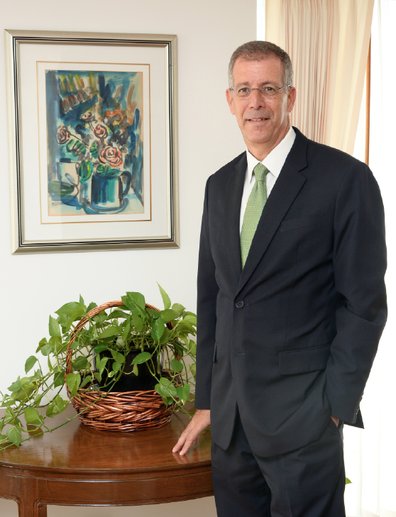
Migrant crisis
“I once heard someone say, ‘If you don’t come to the Middle East then the Middle East will come to you.’ What we see with the migrant crisis is a failure to address the problems of the Middle East. Obviously this part of the world is going through historic, and I would even say tectonic changes. The Middle East as we used to know no longer exists. Fundamental boundaries established by the Sykes-Picot Agreement and then colonial powers England and France no longer exist. What used to be nations and countries are now disintegrating into ethnic, religious and tribal groups. We are going back to how things were in the beginning of the 20th century, and maybe this is more natural. Maybe the artificial colonial borders couldn’t hold for much longer, but the fact is that the entire world is being affected by the atrocities in Iraq and Syria.
“Eventually people get desperate and want to go where they might have more security and a better future, so they go to Europe. It is a tragedy.
“Israel doesn’t want to get involved or intervene because we are seen as an enemy by our neighbours. We don’t want to aggravate the situation and along with the rest of the world we are watching and hoping the people will no longer have to run away from their homes, and be able to live peacefully in their own countries. To put things in perspective, the Israeli-Palestinian conflict is the smallest and least deadly in the Middle East even though it is all the time being put on the high burner. If you look at the number of people killed daily in Syria, Iraq, Yemen and other countries, what is going on in Israel can’t compare.”
Final comments
At the end of our interview the ambassador switched gears and talked about lighter matters, such as how he spends his limited leisure time, highlights of his time in Thailand and what comes next after he leaves. “I don’t have much free time, but I like to go to the gym when I can, and since I started my assignment in Thailand I have gone back to my old love, which is photography. This country is a photographer’s heaven, full of colours, people, temples and beautiful landscapes.”
Commenting on the seemingly never-ending diplomatic functions that ambassadors are expected to attend, Mr Roded said that most of the national day receptions organized by the various embassies look the same and are attended by the same people. Even though most of the functions are similar, they provide an opportunity to exchange informal information with colleagues and get some of their impressions and perspectives on current events.
“Generally speaking, in Israel we like to do things a little differently from time to time. We skipped our National Day reception in 2013 and used the budget for a charity event. We brought a chef from Israel and went to the Mercy Centre in Klong Toey and celebrated together with the children. We gave them a cooking lesson and brought some Israeli kids along. Our entire embassy staff went to the Mercy Centre.
“One experience there left a particularly strong impression on me. The Centre gave me the present of a simple photo taken by a 15-year-old orphan girl, printed on a photocopy machine in black and white. It was wonderful. She was given one-week course by a volunteer photographer who came to teach the kids. The volunteer gave the girl a basic digital camera and taught her about composition and how to capture a moment through photography.
“That was one of many memorable events I will take with me when I leave Thailand. Another was the gala concert last year at the Thailand Cultural Centre celebrating the 60th anniversary of bilateral diplomatic relations. An Israeli conductor led the Thai orchestra and they were accompanied by Israeli and Thai opera singers. The brilliant performance was witnessed by 1,000 guests who sat for an hour and a half without moving. Everyone really enjoyed the event and truthfully it surpassed all our expectations.
“Other than that, things I will take with me include memories of the great food and the generosity of the Thai people. And the smiles, you really cannot exaggerate how much those smiles broaden your heart. This is something we Westerners should bring into our cultures. When someone gives you a genuine smile, you cannot be angry with them. Confrontation and friction evaporate with just a smile.
“All in all I am extremely happy and relaxed in Thailand. We have had some incidents in the past and the job is challenging, but the experience has been wonderful, thanks to the hospitality and the openness of the Thai people. The willingness to listen and to cooperate is something you don’t find easily elsewhere.
“I have one more year to go on this assignment and I will surely miss Thailand. I always used to tell my new recruits that a career in foreign services awards you with the opportunity to start a new life every five years. In my career, I have been to the United States, Japan and now Thailand, and every chapter has brought entirely new challenges and opportunities.”
“I once heard someone say, ‘If you don’t come to the Middle East then the Middle East will come to you.’ What we see with the migrant crisis is a failure to address the problems of the Middle East. Obviously this part of the world is going through historic, and I would even say tectonic changes. The Middle East as we used to know no longer exists. Fundamental boundaries established by the Sykes-Picot Agreement and then colonial powers England and France no longer exist. What used to be nations and countries are now disintegrating into ethnic, religious and tribal groups. We are going back to how things were in the beginning of the 20th century, and maybe this is more natural. Maybe the artificial colonial borders couldn’t hold for much longer, but the fact is that the entire world is being affected by the atrocities in Iraq and Syria.
“Eventually people get desperate and want to go where they might have more security and a better future, so they go to Europe. It is a tragedy.
“Israel doesn’t want to get involved or intervene because we are seen as an enemy by our neighbours. We don’t want to aggravate the situation and along with the rest of the world we are watching and hoping the people will no longer have to run away from their homes, and be able to live peacefully in their own countries. To put things in perspective, the Israeli-Palestinian conflict is the smallest and least deadly in the Middle East even though it is all the time being put on the high burner. If you look at the number of people killed daily in Syria, Iraq, Yemen and other countries, what is going on in Israel can’t compare.”
Final comments
At the end of our interview the ambassador switched gears and talked about lighter matters, such as how he spends his limited leisure time, highlights of his time in Thailand and what comes next after he leaves. “I don’t have much free time, but I like to go to the gym when I can, and since I started my assignment in Thailand I have gone back to my old love, which is photography. This country is a photographer’s heaven, full of colours, people, temples and beautiful landscapes.”
Commenting on the seemingly never-ending diplomatic functions that ambassadors are expected to attend, Mr Roded said that most of the national day receptions organized by the various embassies look the same and are attended by the same people. Even though most of the functions are similar, they provide an opportunity to exchange informal information with colleagues and get some of their impressions and perspectives on current events.
“Generally speaking, in Israel we like to do things a little differently from time to time. We skipped our National Day reception in 2013 and used the budget for a charity event. We brought a chef from Israel and went to the Mercy Centre in Klong Toey and celebrated together with the children. We gave them a cooking lesson and brought some Israeli kids along. Our entire embassy staff went to the Mercy Centre.
“One experience there left a particularly strong impression on me. The Centre gave me the present of a simple photo taken by a 15-year-old orphan girl, printed on a photocopy machine in black and white. It was wonderful. She was given one-week course by a volunteer photographer who came to teach the kids. The volunteer gave the girl a basic digital camera and taught her about composition and how to capture a moment through photography.
“That was one of many memorable events I will take with me when I leave Thailand. Another was the gala concert last year at the Thailand Cultural Centre celebrating the 60th anniversary of bilateral diplomatic relations. An Israeli conductor led the Thai orchestra and they were accompanied by Israeli and Thai opera singers. The brilliant performance was witnessed by 1,000 guests who sat for an hour and a half without moving. Everyone really enjoyed the event and truthfully it surpassed all our expectations.
“Other than that, things I will take with me include memories of the great food and the generosity of the Thai people. And the smiles, you really cannot exaggerate how much those smiles broaden your heart. This is something we Westerners should bring into our cultures. When someone gives you a genuine smile, you cannot be angry with them. Confrontation and friction evaporate with just a smile.
“All in all I am extremely happy and relaxed in Thailand. We have had some incidents in the past and the job is challenging, but the experience has been wonderful, thanks to the hospitality and the openness of the Thai people. The willingness to listen and to cooperate is something you don’t find easily elsewhere.
“I have one more year to go on this assignment and I will surely miss Thailand. I always used to tell my new recruits that a career in foreign services awards you with the opportunity to start a new life every five years. In my career, I have been to the United States, Japan and now Thailand, and every chapter has brought entirely new challenges and opportunities.”
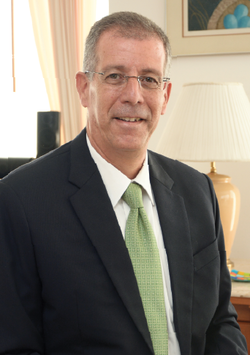
H.E. Simon Roded in focus
Education: 1978-1983 – B.A. International Relations, Hebrew University, Jerusalem.
Career
• Currently: Ambassador of Israel to Thailand (September 25) and non-resident Ambassador to Cambodia (January 28, 2013).
• 2007- Aug 2012: Head of Human Resources and Personnel Training Division, Ministry of Foreign Affairs (MFA), Jerusalem.
• 2003-2007: Head of Information Technologies and Communication Division, MFA, Jerusalem.
• 2000-2003: Head of Budget Management Bureau, MFA, Jerusalem.
• 1998-2000: Counselor Administration and Consul for Consular Affairs, Embassy of Israel, Washington DC, USA.
• 1994-1998: Director of Budget Management Department, MFA, Jerusalem.
• 1990-1994: First Secretary Administration and Consul for Consular Affairs, Embassy of Israel, Tokyo, Japan.
• 1987-1990: Acting Deputy Director of Communications Department, MFA, Jerusalem.
• 1982-1987: Attaché, Permanent Mission of Israel to the UN, New York.
• 1978-1982: Official, Communications Department, MFA, Jerusalem.
Additional assignments
• 2003-2008: Chairman of the Ministry of Foreign Affairs Tenders Committee.
• 2008-Aug 2012: Chairman of the MFA Affairs Legal Assistance and Legal Expenses Committee.
Education: 1978-1983 – B.A. International Relations, Hebrew University, Jerusalem.
Career
• Currently: Ambassador of Israel to Thailand (September 25) and non-resident Ambassador to Cambodia (January 28, 2013).
• 2007- Aug 2012: Head of Human Resources and Personnel Training Division, Ministry of Foreign Affairs (MFA), Jerusalem.
• 2003-2007: Head of Information Technologies and Communication Division, MFA, Jerusalem.
• 2000-2003: Head of Budget Management Bureau, MFA, Jerusalem.
• 1998-2000: Counselor Administration and Consul for Consular Affairs, Embassy of Israel, Washington DC, USA.
• 1994-1998: Director of Budget Management Department, MFA, Jerusalem.
• 1990-1994: First Secretary Administration and Consul for Consular Affairs, Embassy of Israel, Tokyo, Japan.
• 1987-1990: Acting Deputy Director of Communications Department, MFA, Jerusalem.
• 1982-1987: Attaché, Permanent Mission of Israel to the UN, New York.
• 1978-1982: Official, Communications Department, MFA, Jerusalem.
Additional assignments
• 2003-2008: Chairman of the Ministry of Foreign Affairs Tenders Committee.
• 2008-Aug 2012: Chairman of the MFA Affairs Legal Assistance and Legal Expenses Committee.

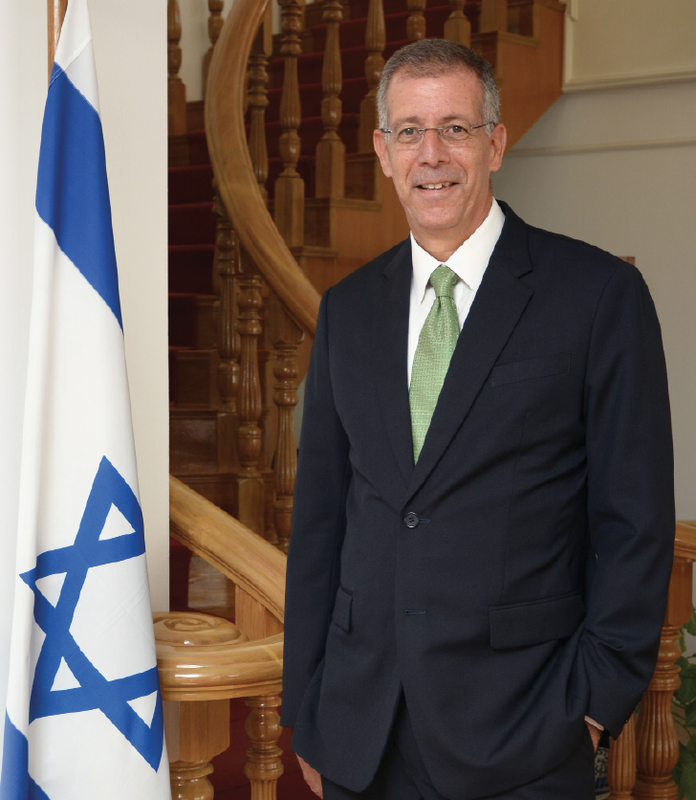

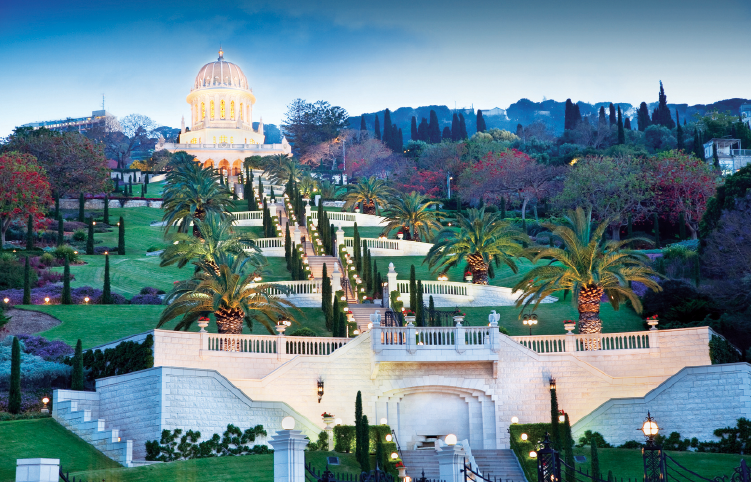
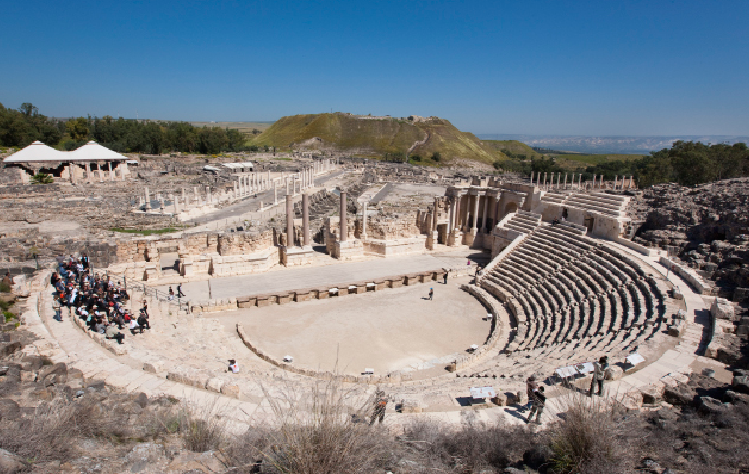
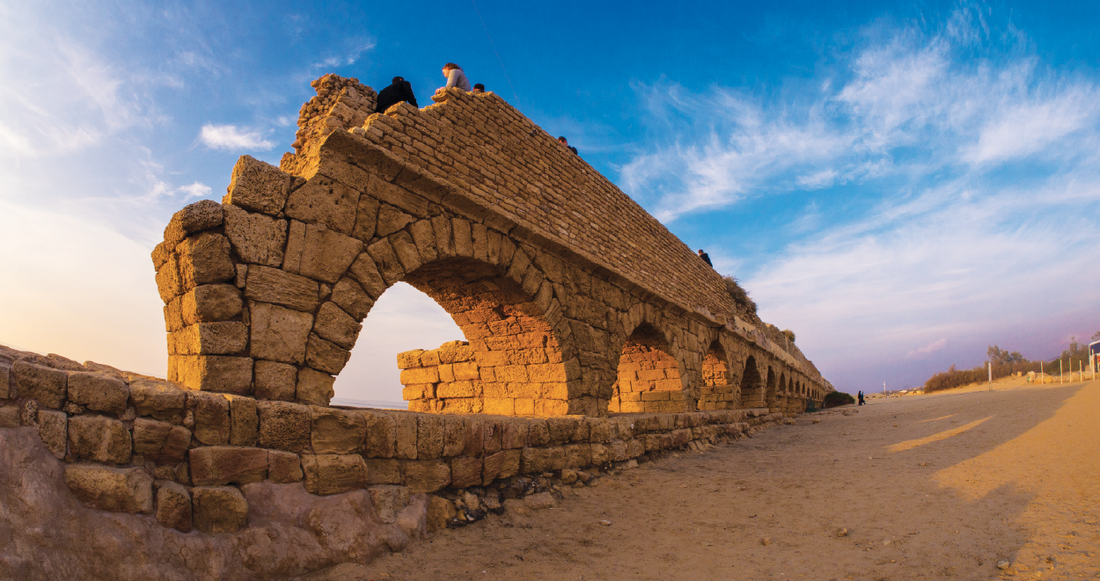
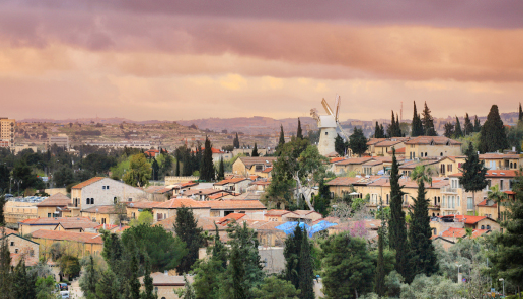
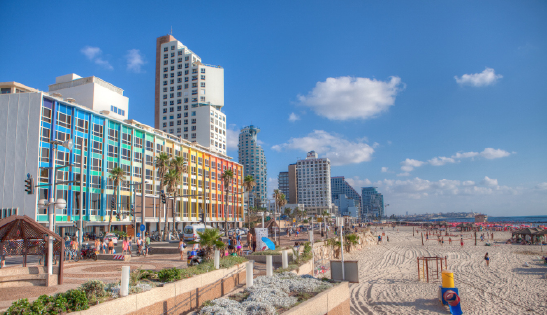
 RSS Feed
RSS Feed
















